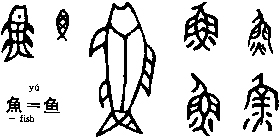 A fish, perhaps a carp.
In the modern form of the character, the fins and scales are simplified and the four dots at the bottom derive from the tail fin.
A fish, perhaps a carp.
In the modern form of the character, the fins and scales are simplified and the four dots at the bottom derive from the tail fin.
The first section of the RC Summary this issue is dedicated entirely to Language or 'Cultural Dialogues and Language Communication Problems'. It includes six papers presented by participants from Israel, Macao, the Netherlands, Portugal and the United States of America who attended an international seminar on Comparative Literature that was recently organized by the Studies, Research and Publications Division of the Cultural Institute of Macao in collaboration with the Macao Association of Comparative Literature.
During this seminar Macao reaffirmed itself as the meeting point for a continuous historic dialogue between Cultures and as the debating ground for themes of acculturation and transculturation. This reenacted a vocation which has gradually been shaping the identity of the territory throughout the centuries.
Publishing this sextet of papers reaffirms RC's strong editorial purpose to promote in the broadest sense testimonies of exchange between East and West; either making public new 'archeological' findings, or dwelling in greater detail contemporary issues. Within its modest limitations, RC always aims at further explicating the multi-layers of understanding common to the Portuguese and the Chinese peoples. We feel that through our constant efforts in this remote territory of the Lusitanian Diaspora we are contributing towards the historical vocation of Portugal; to continually idealize the fraternal polarization of humankind across the globe.
This RC issue also celebrates a great twentieth century Chinese cultural figure whose fame spilled beyond the borders of China to the rest of the world: Ai Qing.
Ai Qing who died recently, is considered by many the most outstanding Chinese poet of this century. He very much belongs the culture Macao.
Following many friendly contacts RC was the fundamental instrument in making this poet's multiple talented facets known to the Portuguese and international public. He is certainly a man of this territory; his works versing on universal themes.
RC holds Ai Qing in such particular esteem and affection that he was proposed in its inaugural first issue as candidate for the Nobel Prize of Literature.
In fact it had been a selected group of Portuguese in Macao who, having recognized his outstanding merit, strongly advocated this Chinese poet from this remote geographic location. They created a movement in support of his candidature to the Noble Prize for Literature, which was immediately echoed by dozens of Chinese poets and writers in solidarity with the initial election.
Ten years ago, RC wrote about Ai Qing: "He is thus a living symbol of Life, the Man who lives with and sings some of the most permanent woes of the human condition, lovingly solidarity with the condition of all created things.
A pioneer of the opening of Chinese culture to Western patterns, Ai Qing is, today, one of the main representatives and agents of the contact of the Chinese people with the other peoples in the whole world. [...]
For all that — the Poet and his Work, the Man and what he stands for, for the historical opportunity to re-link the most original and primeval Culture of the present Human generation to the brotherly universal congregation — for all this, we have seen in Ai Qing, the advisable candidate to the Nobel Prize of Literature." [RCI. 4, p. 37].
Right from its beginning RC has been sensitive to Ai Qing's personality: the rebel fighter, singer and ardent proclaimer of all miserable souls, of human injustice and of all destitute races, enchanted by the lucid and confident herald of a brighter future and the renaissance of peace and hope "[...] faithful companions of life till death do us part."
The simple In Memorian testimony of this RC issue for Ai Qing reasserts our deepest feelings for this great yet humble friend. This homage represents the uninterrupted adherence to true values and reconfirms links of solidarity with the culture of Chinese neighbouring regions and the great nation of China as a whole.
This issue of RC closes with a number of articles dedicated to the history of Macao. They are the comparative and cummulative results of researches from C. R. Bawden, Zhang Wenqin and Huang Hongzhao, and as such, this small corpus of contributions unanimously reconfirms the history of Macao as a collaborative project, the result of the exchange of joint efforts by Chinese, English, and Portuguese speaking researchers. The positive value of this continuous collaboration has become increasingly apparent recently, as deeper knowledge of important factors shared by the Portuguese and Chinese communities of this tiny peninsula, has proved fundamental to explain previously nebulous areas of undocumented 'records'.

Luís Sá Cunha
Editorial Director
start p. 3
end p.